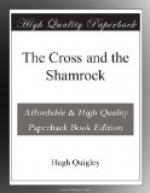The reader may imagine, for we cannot adequately describe, the burden of woe and grief which took possession of the soul of Paul when he found that his darling brother, on whose account he suffered so much anxiety and came such a distance, was gone forever from his sight. And when he learned how he died; how, after countless tortures, by whippings, by hunger, and by confinement, the delicate martyr of Christ was allowed to perish on the damp floor of an old, deserted house; how he was deprived of the memorials of his faith and country; how he was buried with as little ceremony, and as much indifference, as if he had been an irrational animal,—when he learned all these circumstances from the two Irish cotters, Lee and Twohy, it took him to pray continually not to yield to feelings of hatred and revenge.
A circumstance related to him, however, by the peasants, whose hospitality Paul consented to avail himself of for a few days, served to reconcile him to Eugene’s fate, and to inspire him with the most exalted sentiments of forgiveness and good will towards the murderers of his brother. Every night since Eugene’s burial a bright column of light was seen rising from his tomb, and terminating in the heavens above, where the column became gradually wider, till it became like a wide circle of glory, similar to that which appears around the moon on a winter’s night, when the atmosphere is at the snowing temperature. In the centre of the circle appeared a beautiful cross of most perfect proportions, and so bright in the bright circle that it was perfectly dazzling, and the sight could with difficulty be fixed on it for an instant.
This phenomenon was seen by the two Irish cotters frequently, and all the neighbors around had observed the lower part of the column, but concluded that it was phosphorus, which, they said, from some cause or other, either the nature of the soil or from the bodies interred there, ascended to the clouds, attracted by some atmospheric body there. Paul, too, was blessed with this happy sight, but without indulging in the gratification of a too curious or protracted observation of this vision; and being fully convinced that it was no phosphoric combination of natural phenomena, concluded to take off the body of his beloved brother, and have it interred, in a Christian manner, in the same consecrated tomb in which the remains of his father reposed. He was also fortunate enough, by the payment of a liberal bonus, to succeed in raising the body of his mother, whose tomb he was able to find out, by a measurement which, on the day of her interment, he had made, and from certain stones placed by him at the head of her coffin.




